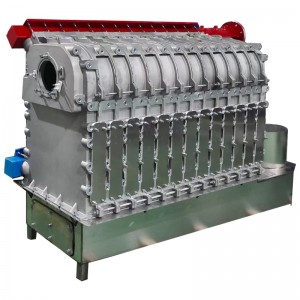Aug . 20, 2024 23:25 Back to list
Efficient Hot Water Solutions with Condensing Boilers and Storage Tanks
The Benefits of a Condensing Boiler Hot Water Tank
As energy efficiency and sustainability become increasingly important in today’s world, homeowners and businesses alike are seeking innovative solutions to meet their heating and hot water needs. One such solution that has gained popularity is the condensing boiler hot water tank. This system not only provides a reliable source of hot water but also offers significant advantages in terms of efficiency, cost-effectiveness, and environmental impact.
What is a Condensing Boiler?
A condensing boiler is a type of high-efficiency boiler that extracts additional heat from the exhaust gases produced during combustion. Unlike traditional boilers, which lose a considerable amount of heat through their flues, condensing boilers utilize advanced technology to recover some of this lost heat. This is achieved by condensing the water vapor in the exhaust gases, which releases latent heat that can be redirected to heat water for domestic use or space heating.
Efficient Use of Energy
The primary advantage of a condensing boiler hot water tank lies in its energy efficiency. Since condensing boilers can achieve efficiency ratings of over 90%, they consume less fuel to produce the same amount of heat compared to conventional boilers. This means lower energy bills for homeowners and businesses, making condensing boiler systems a cost-effective heating solution in the long run.
Additionally, because condensing boilers operate at lower temperatures, they are better suited for use with modern heating systems such as underfloor heating and low-temperature radiators. This allows for more effective use of the energy produced, further enhancing the overall efficiency of the system.
Instantaneous Hot Water Supply
condensing boiler hot water tank

Condensing boiler hot water tanks are designed to provide an adequate supply of hot water without the delays associated with traditional systems. By integrating a hot water storage tank with the condensing boiler, users can benefit from a sufficient volume of hot water when needed, whether for domestic chores, showers, or heating demands. This eliminates the concerns of running out of hot water and enhances comfort, especially in larger households or during peak usage times.
Reduced Carbon Footprint
In an era where reducing carbon emissions is paramount, condensing boilers play a crucial role in making homes and businesses more environmentally friendly. By consuming less fuel and producing lower emissions, these systems contribute to a reduced carbon footprint. For those looking to make a positive impact on the environment, transitioning to a condensing boiler hot water tank is a significant step towards achieving sustainability goals.
Compliance with Regulations
As governments worldwide impose stricter regulations on energy efficiency and emissions, condensing boilers have become a preferred choice. Many new building codes require high-efficiency heating systems, and installing a condensing boiler hot water tank can help meet these requirements. This not only ensures compliance with regulations but also increases the property’s value and attractiveness on the market.
Conclusion
In summary, the condensing boiler hot water tank represents a forward-thinking solution for efficient heating and hot water supply. With its high efficiency, reduced environmental impact, and ability to provide instant hot water, it is an ideal choice for modern homes and businesses. As energy prices continue to rise and regulations become more stringent, investing in a condensing boiler hot water tank is a smart decision for those looking to enhance their heating systems while also making a positive contribution to the environment.
-
Durable Centrifugally Cast Iron Water Main Pipe
NewsAug.11,2025
-
Centrifugally Cast Iron Water Main Pipes for Reliability
NewsAug.10,2025
-
High-Quality Centrifugally Cast Iron Water Main Pipes
NewsAug.09,2025
-
Durable Cast Iron Water Main Pipe & Drainage Solutions
NewsAug.08,2025
-
Buy Cast Iron Pipe: Premium Ductile Iron & Drain Solutions
NewsAug.07,2025
-
Durable Cast Iron Water Main Pipe | Buy Ductile Pipe
NewsAug.06,2025


